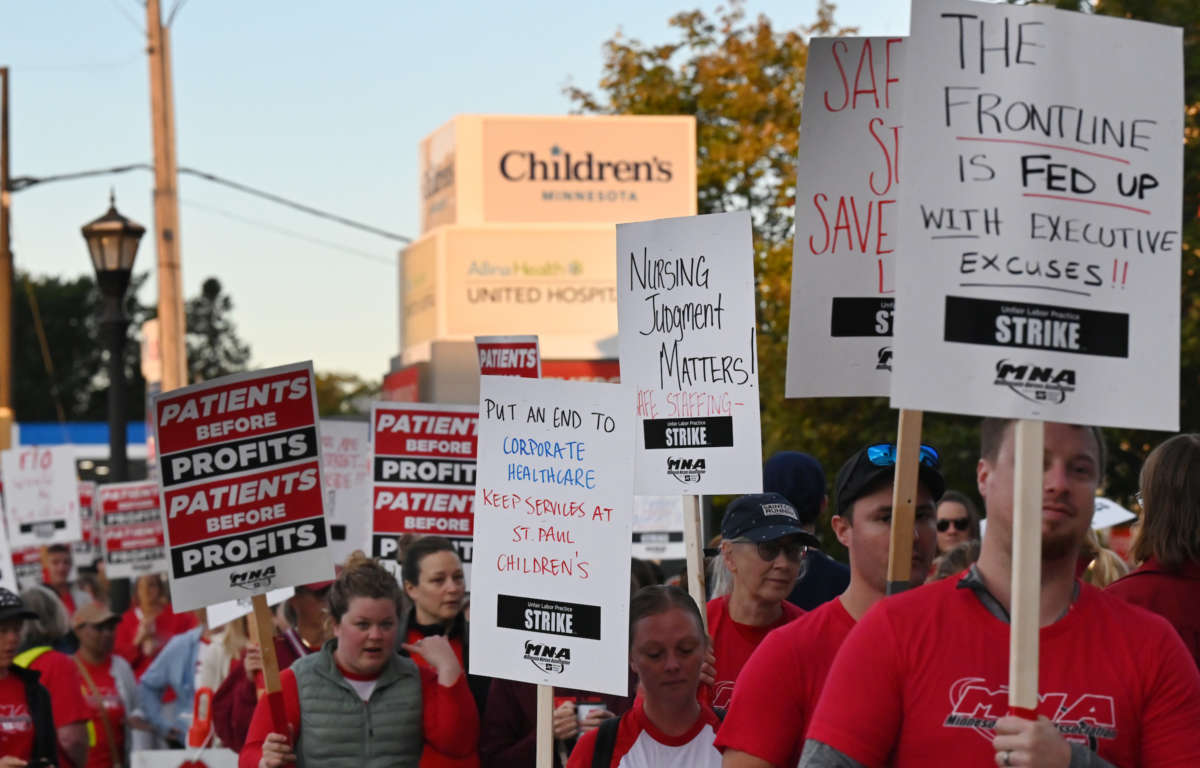Fifteen thousand Minnesota nurses began a three-day strike on Monday in what the Minnesota Nurses Association (MNA) says is the largest private sector nurses’ strike in U.S. history.
The strike spanned 16 Minnesota hospitals and was authorized by union members last month after over five months of negotiations with hospital administrators led to what the union says are inadequate or essentially nonexistent offers for workers’ safety, staffing and salary demands.
“Hospital executives have already driven nurses away from the bedside by their refusal to solve the crises of staffing and retention in our hospitals, and we hope they will not be so brash as to fire nurses for standing up to demand better,” MNA said in a statement earlier this month.
“If hospital executives want to avoid a strike on September 12, they should spend less time and money on lawyers and more time working with nurses to settle fair contracts to improve patient care and working conditions in our hospitals,” the union continued.
Nurses say that, while they didn’t want to strike, issues like understaffing at their hospitals mean they aren’t able to adequately provide for patients, even when a patient is facing an urgent or emergency situation.
“I can’t give my patients the care they deserve,” Chris Rubesch, vice president of the Minnesota Nurses Association and a Duluth nurse, told The Washington Post. “Call lights go unanswered. Patients should only be waiting for a few seconds or minutes if they’ve soiled themselves or their oxygen came unplugged or they need to go to the bathroom, but that can take 10 minutes or more. Those are things that can’t wait.”
Strike lines are rocking across the state! #patientsbeforeprofits #striketember pic.twitter.com/vg0BUzCExR
— Minnesota Nurses (@mnnurses) September 12, 2022
The union has asked for a 27 to 30 percent raise over the next three years. These raises would more closely match both inflationary and staffing pressures that its members face, they say — especially as nurses as a whole have faced increased risks throughout the pandemic.
Hospital administrators have countered with a 10 to 12 percent raise over the next three years, or a bit over 3 percent a year on average — far lower than recent rates of inflation. The hospitals blame the strike on workers, saying that they have refused to negotiate, though the MNA claims it is administrators who haven’t budged on key issues.
“Nurses have steadfastly refused to go to mediation,” a spokesperson for Twin Cities Hospital Group said to The Washington Post. “Their choice is to strike.”
Many of the hospital groups are hiring nurses to replace workers as they strike; Twin Cities Hospital Group said that it’s hiring 2,000 traveling nurses during the strike, while other affected hospitals are also bringing in temporary workers, according to reports.
The workers have garnered the support of local and national lawmakers, including Minnesota Attorney General Keith Ellison, a Democratic–Farmer–Labor Party member, and Sen. Bernie Sanders (I-Vermont).
“I stand in solidarity with the 15,000 [Minnesota nurses] on strike this week fighting for safer care, fair scheduling, and higher wages,” Sanders said on Twitter Monday. “Nurses are the backbone of our health care system. They understand what’s best for their patients.”
The health care sector is facing major issues with nurse staffing, which has taken a huge hit amid the pandemic and never quite recovered. While administrators complain that nurses are “exploiting” the shortage, nurses across the country have said that the shortage can be chalked up to hospitals’ failures to adequately invest in their own workers. Such failures also endanger patients, nurses say.
Health care workers have led strikes throughout the pandemic. According to the Bureau of Labor Statistics, there were five strikes of over 1,000 workers from unions representing health care workers in 2020 and four such strikes in 2021.
Labor activity in the sector appears to be reaching a new high this year, according to Healthcare Dive, with at least seven strikes of 1,000 workers or more in health care so far, including the Minnesota workers’ strike. Recently, a strike set to consist of hundreds of nurses at UW Health in Madison, Wisconsin, was narrowly averted.
Join us in defending the truth before it’s too late
The future of independent journalism is uncertain, and the consequences of losing it are too grave to ignore. To ensure Truthout remains safe, strong, and free, we need to raise $43,000 in the next 6 days. Every dollar raised goes directly toward the costs of producing news you can trust.
Please give what you can — because by supporting us with a tax-deductible donation, you’re not just preserving a source of news, you’re helping to safeguard what’s left of our democracy.
